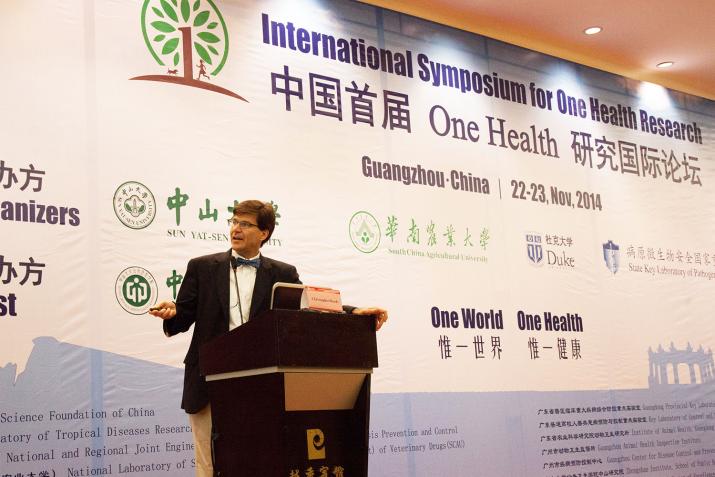Nearly 200 One Health researchers from around the world gathered at the inaugural International Symposium on One Health Research (ISOHR) at Guangzhou, China this past weekend. This two-day event, co-hosted by Duke Global Health Institute, featured research presentations that highlighted One Health themes, promoted student research and initiated collaborations with surrounding institutions. One Health is an initiative promoting collaboration between multiple disciplines working locally, nationally, and globally, to attain optimal health for people, animals, and our environment. This initiative has been a focal point of DGHI’s training since 2003.
In 2012, DGHI faculty member Gregory Gray pitched the idea for a One Health symposium to be held at Sun Yat-sen University focusing on the research conducted in China. Chinese researchers, led by Professor Jiahai Lu of Sun Yat-sen University and Professors Giuhong Zhang and Lingshuang Sun of South China Agricultural University, embraced this opportunity to create an international symposium focusing on food security, emerging zoonoses, environmental science, antimicrobial resistance and wildlife ecology. The vision of this symposium was to attract high-level researchers and foster One Health thinking in young researchers. In order to achieve the latter, a student research competition accompanied panel discussions and research presentations.
“We are very fortunate to have Duke as the leading United States partner in this venture,” said Gray. “Although this is not the first international meeting on One Health, it is the first of its kind to foster One Health thinking in China, especially among young researchers who hold the keys to making One Health a foundational principle for the future.”
The One Health concept is of particular interest to researchers in the Guangdong Province due to its dense populations of mixed domestic and exotic animals and humans, which creates opportunities for pathogens to be easily transferred between species. This environment has given rise to numerous zoonotic disease outbreaks such as severe acute respiratory syndrome (SARS), H7N9 avian influenza A virus, and dengue fever. Due to these factors and the complex environmental issues within the providence, Guangdong Province officials have focused their efforts and resources on One Health research.
Gray and Christopher Woods, director of graduate studies at DGHI, joined senior researchers from a number of countries including Australia, China, Kazakstan, Kyrgystan, Mongolia, Nepal, Romania, Singapore, Sri Lanka, Thailand, United States, and Vietnam to promote interdisciplinary research necessary to address complex problems and to encourage multiple Chinese institutions to embrace the One Health concept in Guangdong Province. This symposium demonstrated DGHI’s continued investment in challenging Chinese counterparts to break down the silos between veterinary and human disease research. Through these efforts, DGHI hopes to promote the collaborative efforts of multiple disciplines working locally, nationally and globally to attain optimal health for people, animals and the environment.


